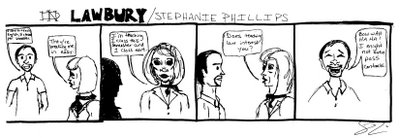Week Six, Part 6 - Singin’ the 1L Blues
 On Friday after supper, I drive Terri and the girls from South Bend to Michigan. The plan is to drop off Steph and Lauren for weekend visitation with their dad. Then Terri and I will continue on to Reading, Michigan, the one-stoplight town where my grandmother lives.
On Friday after supper, I drive Terri and the girls from South Bend to Michigan. The plan is to drop off Steph and Lauren for weekend visitation with their dad. Then Terri and I will continue on to Reading, Michigan, the one-stoplight town where my grandmother lives.The trip does not begin well, a reflection of a stressful and sexless week.
I’m sullen. There’s only one place I should be tonight: my cube in the Kresge Law Library. Unless I get a handle on the substantive classes, I’m gonna flunk out. Torts is whizzing by me. Contracts could get ugly if I keep sloughing on my prep. In Crim, I’m lost when Professor Dutile compares the holdings in two or three different cases. CivPro has me feeling like an imbecile. During the last two weeks, I haven’t known the answer to any significant question from Professor Bauer.
Terri’s grumpy. She complains about work at AT&T. “My contact at Berkel is furious because an employee got an unauthorized calling card. So I rang up New Jersey and ripped on someone in corporate.”
Stephanie, age seven, has turned into the eggshell girl. She cries almost every night when Terri puts her to bed. "I didn't get to spend any time with youuuuuuuuu."
"Stop it," Terri will say. "We’ve been glued together since this afternoon. You walked around the block with me. We played Checkers and two games of Lion King."
"But I didn't get to read to youuuuuuu," Stephie sobs.
Only Lauren, age five, seems to be doing okay.
After an hour in the car, we stop at the Michigan border north of Angola, Indiana. Terri’s ex-husband is late as usual. More wasted time, I think. After twenty minutes he arrives and without apology loads up the girls.
Terri and I drive on in stony silence. I’m unhappy, she’s unhappy, we’re unhappy.
Life was easier ten months ago, I think. No wife. No kids. No mortgage. No case briefs. No Socratic method. No tuition bills.
Terri starts to cry. “This has been the worst week of my life, and tonight is par for the course." Her tears soften me. I reach out and put my hand on her shoulder.
She tells me more about work. Her biggest client, an infomercial company, is building a call center in Texas. It wants impossible assurances on price and performance. She adds that Stephie is being teased by the boys in AWANA for not finishing her Bible memory book from last year.
Then Terri listens as I sing the 1L blues. Too old. Too dumb. Too poor.
Like a mental health professional, Terri pats my knee, then she musses my hair. “You’ll do great,” she says. “Don’t get wigged out.”
By the time we get to Reading, Michigan, equilibrium has been restored. I feel stronger, more resolute.
My grandma, Lillian Frantz, meets us at the door of her five-room bungalow. Over a glass of homemade tomato juice, we talk about the weather and her garden.
She asks about law school and I mumble that “I’m learnin’ a lot.”
Grandma, who is a 1934 grad of Waldron High School in Michigan, says she had one year of law in 10th grade. After graduation, she wanted to be a secretary in a law firm, and a business college in Jackson offered her a scholarship. “They had it set up so I could live with a family and do a little bit of light housekeeping – but not enough to affect my homework.”
“Did you go?” Terri asks.
“My mother wouldn’t let me!” Grandma exclaims. “She’d always lived in the country. Baldwin. Hudson. Prattville, which isn’t even a town anymore. She didn’t think the city was any place for a country girl. That was her attitude and I had to abide it.”
Instead of college, Grandma worked four years in a factory, then married Arthur Hack.
“After your mom was born,” she says to me, “I took in washing and ironing. The nurse’s outfits were fun. You had to have them damp and your iron couldn’t be too hot or you’d scorch ‘em. I’d make dresses for 75 cents.”
Terri asks when she started doing hair.
“I was 43 when I went to beauty school,” she says, “the grandma of the class. One gal was 17, so at first I was pretty self-conscious. But I got through it all right.”
Wow! I never knew about Grandma’s interest in law or the details of her re-education. Terri catches my eye and I know she’s noticed the similarities.
I smile at Terri and think that, no matter how law school turns out, I’m glad we're in it together.
* * *





